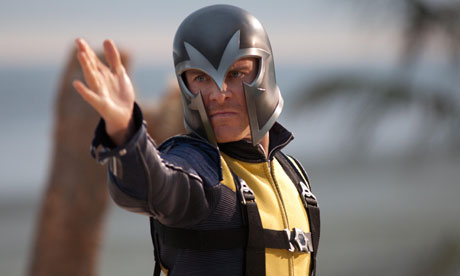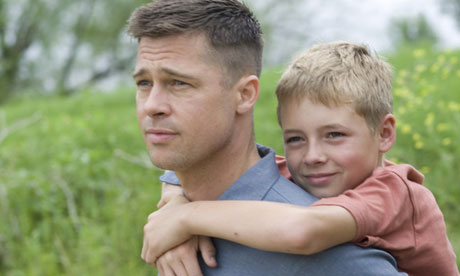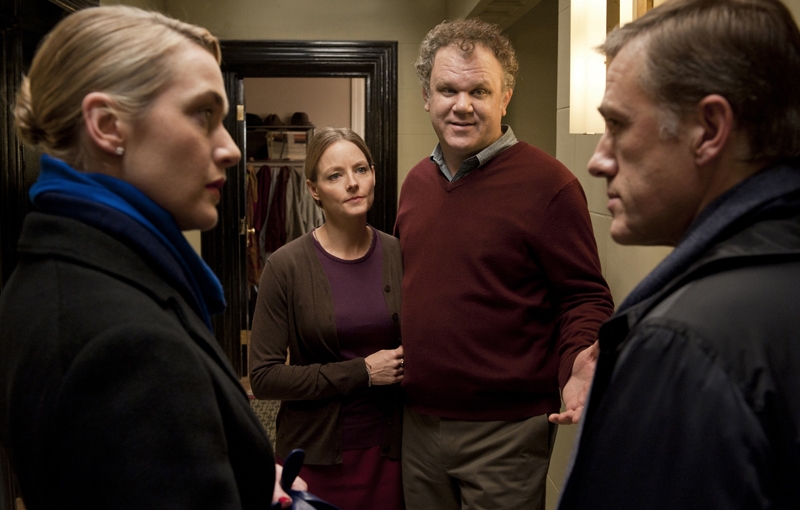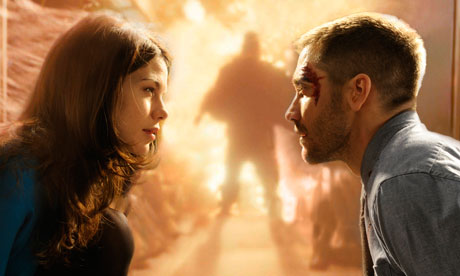 Magneto.
Magneto.Because of the dismal "X-Men Origins: Wolverine", I never really looked forward to watch "X-Men: First Class" mainly because of a premature thought that if even the iconic Wolverine can't seem to bring the film franchise into places other than 'Mediocrity Avenue', what more a bunch of barely adolescent mutants? I saw the film's stills showing them young lads wearing yellow-colored battle gears of some sort and wasn't particularly impressed. I found out about how Wolverine isn't even included in the mix and was immediately sensing doom. But then I saw that Matthew Vaughn, the director of the underrated gem "Layer Cake" and "Stardust" (not to mention "Kick-Ass", which I consider a bit overrated and oh so over-the-top but still quite decent) will direct it, that wonderful actors James McAvoy and Michael Fassbender will headline it, and I was intrigued. I read about how "X-Men: First Class" would tackle the 'secret ' history of the Cold War and I was slightly elated.
But still, I haven't seen it in theaters for no particular reason other than the fact that my anticipation towards it wasn't really that high like that of a devoted fanboy or a pumped-up viewer. After watching the film, considering that I'm not even a fan of the previous films or a compulsive reader of the comic books, which of course suggests my slight indifference towards the "X-Men" universe in general, I still immediately thought that it is indeed one of the best superhero films that I have ever seen. Color me surprised.
Was it the actors, the story or the execution? I think that these three have indeed contributed to the overall experience, especially McAvoy and Fassbender's great and seemingly effortless portrayals of Charles Xavier a.k.a. Professor X and Erik Lensherr a.k.a. Magneto respectively, who both equaled and, at times, even fully surpassed the standards set by Patrick Stewart and Ian McKellen's performances in the earlier "X-Men" film incarnations. Although on a slightly negative note, I thought that Kevin Bacon's character Sebastian Shaw is too exaggeratedly maniacal considering that the film's core premise is more or less still particularly grounded in reality, or to be even more specific, in history. And really, I just can't imagine anyone else other than Magneto wearing that telepath-blocking, Greek warrior-like helmet.
Aside from the semi-tragic regression of Professor X and Magneto's relationship from best friends into eternal foes which is the film's real highlight, "X-Men: First Class"' other real star is the very scope of the narrative. Never have I seen a popcorn superhero movie, aside from "Watchmen" maybe (though I can't consider that to be a popcorn film), that has bravely tackled a quiet yet extremely turbulent part of our history which is the Cold War, or even more specifically, the Cuban Missile Crisis, which is the closest the world has gotten to a full-blown nuclear war, and was also able to create excellent, special effects-laden action set pieces out of it.
And what's more impressive with "X-Men: First Class" is that it even squeezed an engaging and entertaining story out of such a politically-charged military affair without feeling forced or distracting, execution-wise. Hell, Michael Bay's "Pearl Harbor's" love triangle story arc feels even much more contrived when compared to this, which really proves the strength of this film's screenplay.
And considering that it's about mutants and nuclear war, and especially the fact that "X-Men: First Class" basically belongs in the superhero genre, a category which we all know to have been following a flawed storytelling dogma ever since Superman messed with the idea of dual identity and Lex Luthor with megalomaniacal villainy, sure, the film has all the energy and visual force prevalent in a typical superhero feature, but more importantly, it also has enough threads of reality to counter an otherwise chaotic CGI fest with filmic sobriety.
With a story and presentation neatly balancing its tone to appeal to everyone, from the typical blockbuster suckers to the more nitpicking purists who want source material faithfulness more than anything else up to the history buffs who appreciate a parallel reality once in a while, "X-Men: First Class" is both substance and style, power and grace, a film that teeters between 'rage' and 'serenity'; a rare feat for a film categorized in a genre where it's perfectly fine, or sometimes even compulsory, to neglect the first and wallow in the latter.
This film may not be like "Watchmen" in terms of thematic depth and quasi-philosophical take regarding the superhero mythos and the end of days, but "X-Men: First Class" delivered what it needed to in ways that are extremely satisfying, truly exciting and even thought-provoking: As a commercial and critical sleeper hit that gives a fast-waning superhero movie franchise a much-needed jolt of life, as a picture-perfect origin story that sets the bar high for other cinematic prequels, and as an allegorical exploration of discriminatory hate. This is the most definitive "X-Men" film yet.
But still, I haven't seen it in theaters for no particular reason other than the fact that my anticipation towards it wasn't really that high like that of a devoted fanboy or a pumped-up viewer. After watching the film, considering that I'm not even a fan of the previous films or a compulsive reader of the comic books, which of course suggests my slight indifference towards the "X-Men" universe in general, I still immediately thought that it is indeed one of the best superhero films that I have ever seen. Color me surprised.
Was it the actors, the story or the execution? I think that these three have indeed contributed to the overall experience, especially McAvoy and Fassbender's great and seemingly effortless portrayals of Charles Xavier a.k.a. Professor X and Erik Lensherr a.k.a. Magneto respectively, who both equaled and, at times, even fully surpassed the standards set by Patrick Stewart and Ian McKellen's performances in the earlier "X-Men" film incarnations. Although on a slightly negative note, I thought that Kevin Bacon's character Sebastian Shaw is too exaggeratedly maniacal considering that the film's core premise is more or less still particularly grounded in reality, or to be even more specific, in history. And really, I just can't imagine anyone else other than Magneto wearing that telepath-blocking, Greek warrior-like helmet.
Aside from the semi-tragic regression of Professor X and Magneto's relationship from best friends into eternal foes which is the film's real highlight, "X-Men: First Class"' other real star is the very scope of the narrative. Never have I seen a popcorn superhero movie, aside from "Watchmen" maybe (though I can't consider that to be a popcorn film), that has bravely tackled a quiet yet extremely turbulent part of our history which is the Cold War, or even more specifically, the Cuban Missile Crisis, which is the closest the world has gotten to a full-blown nuclear war, and was also able to create excellent, special effects-laden action set pieces out of it.
And what's more impressive with "X-Men: First Class" is that it even squeezed an engaging and entertaining story out of such a politically-charged military affair without feeling forced or distracting, execution-wise. Hell, Michael Bay's "Pearl Harbor's" love triangle story arc feels even much more contrived when compared to this, which really proves the strength of this film's screenplay.
And considering that it's about mutants and nuclear war, and especially the fact that "X-Men: First Class" basically belongs in the superhero genre, a category which we all know to have been following a flawed storytelling dogma ever since Superman messed with the idea of dual identity and Lex Luthor with megalomaniacal villainy, sure, the film has all the energy and visual force prevalent in a typical superhero feature, but more importantly, it also has enough threads of reality to counter an otherwise chaotic CGI fest with filmic sobriety.
With a story and presentation neatly balancing its tone to appeal to everyone, from the typical blockbuster suckers to the more nitpicking purists who want source material faithfulness more than anything else up to the history buffs who appreciate a parallel reality once in a while, "X-Men: First Class" is both substance and style, power and grace, a film that teeters between 'rage' and 'serenity'; a rare feat for a film categorized in a genre where it's perfectly fine, or sometimes even compulsory, to neglect the first and wallow in the latter.
This film may not be like "Watchmen" in terms of thematic depth and quasi-philosophical take regarding the superhero mythos and the end of days, but "X-Men: First Class" delivered what it needed to in ways that are extremely satisfying, truly exciting and even thought-provoking: As a commercial and critical sleeper hit that gives a fast-waning superhero movie franchise a much-needed jolt of life, as a picture-perfect origin story that sets the bar high for other cinematic prequels, and as an allegorical exploration of discriminatory hate. This is the most definitive "X-Men" film yet.
FINAL RATING










